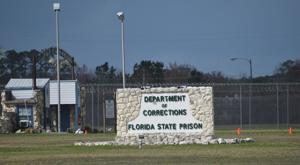A man who murdered his wife and two children nearly three decades ago is set to be executed in Florida. Republican Governor Ron DeSantis signed the death warrant for Edward J. Zakrzewski, II, on Tuesday, marking a significant step in a case that has lingered in the state’s legal system since 1994.
The execution is scheduled to take place at Florida State Prison, underscoring the state’s continued use of capital punishment under Governor DeSantis’s administration. Zakrzewski was convicted of killing his wife, Sylvia, and their two children, Edward III and Anna, after his wife filed for divorce.
The Crime and Its Aftermath
In June 1994, Zakrzewski brutally attacked his family in their home in Gulf Breeze, Florida. According to court documents, he used a hammer and a knife to murder his wife and children. The crime shocked the local community and drew national attention due to its brutality and the young ages of the victims.
Zakrzewski fled to Hawaii following the murders, where he was eventually apprehended and extradited back to Florida. In 1996, he was found guilty of three counts of first-degree murder and sentenced to death. Over the years, his case has seen numerous appeals, but the courts have repeatedly upheld the original verdict.
Legal Proceedings and Appeals
The legal journey of Zakrzewski’s case has been long and complex. His defense team has filed multiple appeals, citing various issues, including claims of ineffective counsel and mental health concerns. However, these appeals have been consistently denied by both state and federal courts.
Florida has a history of contentious death penalty cases, and Zakrzewski’s is no exception. The state’s legal system has been under scrutiny for its handling of capital punishment, particularly concerning the lengthy appeals process and the methods of execution used.
Expert Opinions and Public Reaction
Experts on capital punishment note that cases like Zakrzewski’s highlight the ongoing debate over the death penalty in the United States. Some argue that the lengthy time between conviction and execution undermines the justice system, while others believe it is necessary to ensure due process.
“The Zakrzewski case is a stark reminder of the complexities involved in capital punishment,” said Dr. Emily Carter, a criminal justice professor. “It raises questions about the efficacy and morality of the death penalty, especially when cases drag on for decades.”
The public reaction to Zakrzewski’s scheduled execution has been mixed. Some community members feel that justice is finally being served, while others express concern over the ethical implications of capital punishment.
Historical Context and Future Implications
Florida has long been one of the leading states in the use of the death penalty. The state resumed executions in 1979 after a brief moratorium and has since executed over 100 individuals. The Zakrzewski case is part of this broader historical context, reflecting the state’s firm stance on capital punishment.
Governor DeSantis has been a vocal supporter of the death penalty, and his administration has overseen several executions since he took office. The signing of Zakrzewski’s death warrant aligns with his broader law-and-order agenda.
Looking ahead, the execution of Edward J. Zakrzewski, II, may influence ongoing discussions about the future of the death penalty in Florida and across the nation. It serves as a pivotal moment in the state’s legal history, potentially impacting future legislative and judicial decisions regarding capital punishment.
As the scheduled execution date approaches, attention will likely focus on both the legal proceedings and the broader societal implications of this case. The execution of Zakrzewski not only closes a chapter in a tragic story but also reignites the debate over the role of the death penalty in modern America.
About The Author
 Bryan Kohberger to Plead Guilty in University of Idaho Stabbings to Avoid Death Penalty
Bryan Kohberger to Plead Guilty in University of Idaho Stabbings to Avoid Death Penalty Atletico Madrid Strengthens Midfield with Álex Baena Signing from Villarreal
Atletico Madrid Strengthens Midfield with Álex Baena Signing from Villarreal Millions at Risk of Losing Health Insurance Under GOP Tax Bill
Millions at Risk of Losing Health Insurance Under GOP Tax Bill Millions at Risk of Losing Health Insurance Under Proposed GOP Tax Bill
Millions at Risk of Losing Health Insurance Under Proposed GOP Tax Bill Oklahoma City Celebrates Independence Day with Spectacular Fireworks and Festivities
Oklahoma City Celebrates Independence Day with Spectacular Fireworks and Festivities